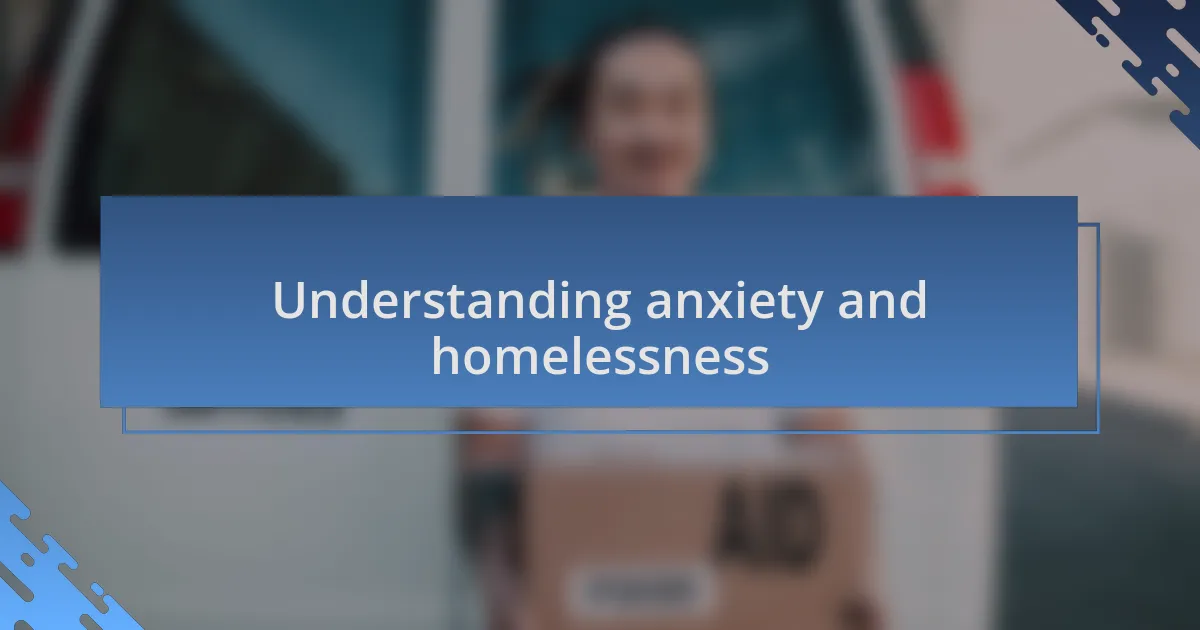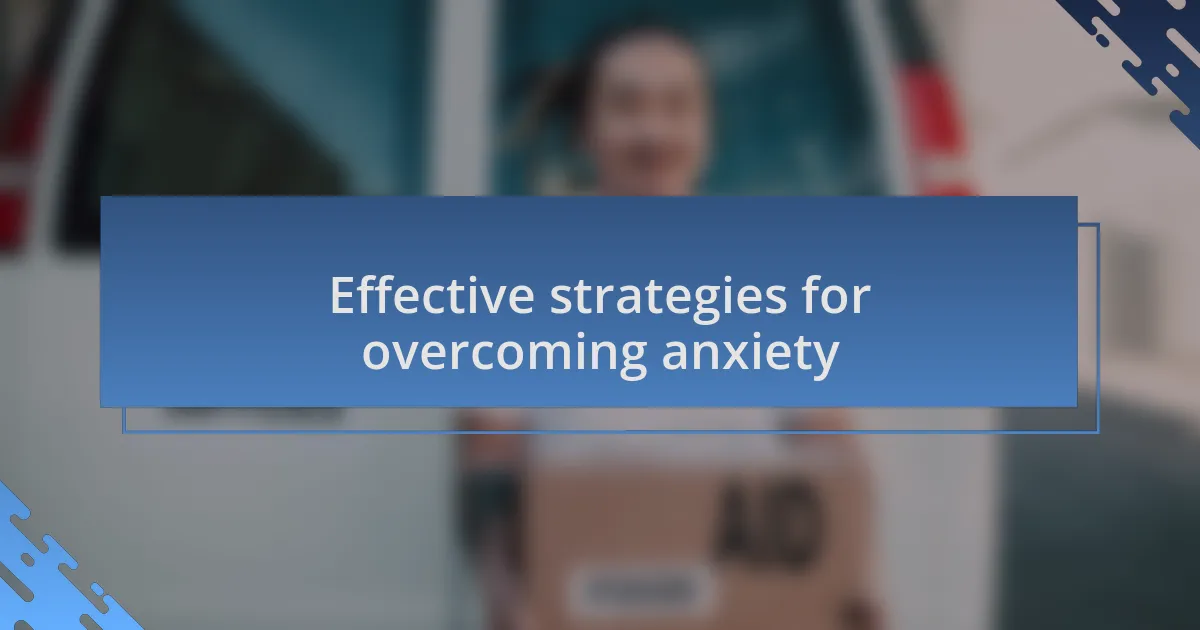Key takeaways:
- Anxiety can both cause and be exacerbated by homelessness, creating a persistent cycle of instability and fear.
- Establishing a consistent routine, practicing breathing exercises, and reaching out for support are effective strategies to manage anxiety.
- Volunteering at a homeless charity provided personal insights, emphasizing resilience, community connection, and the importance of mutual support.
- Building a support network through open communication and nurturing relationships can significantly alleviate feelings of anxiety and isolation.

Understanding anxiety and homelessness
Anxiety can be both a cause and a consequence of homelessness, creating a vicious cycle that’s hard to break. I remember meeting someone who had lost their job and subsequently their home; the anxiety from instability spiraled into feelings of helplessness. Can you imagine feeling trapped in a cycle where each step toward recovery becomes overshadowed by overwhelming fear?
For many experiencing homelessness, anxiety often stems from constant uncertainty and insecurity. I often hear stories of individuals worrying about where their next meal will come from or if they’ll find a safe place to sleep. It makes me wonder – how can one find peace when every day feels like a struggle for survival?
The stigma attached to both anxiety and homelessness can intensify the emotional burden. I once assisted a person who felt isolated not only from society but also from support networks due to judgment. It’s heartbreaking to think about how many people might stay silent, suffering in solitude instead of seeking help.

Effective strategies for overcoming anxiety
When it comes to overcoming anxiety, I find that establishing a consistent routine can be incredibly grounding. I recall a time when I was feeling particularly anxious, and just by setting a daily schedule for meals, exercise, and self-care, I discovered an unexpected sense of control. Isn’t it fascinating how something as simple as structure can make the chaos around us seem a little less overwhelming?
Breathing exercises also play a crucial role in managing anxiety. I’ve been in situations where my heart raced, and I felt like I couldn’t think straight. Taking slow, deep breaths helped me regain my focus and calm my mind. Have you ever tried measuring your breath count? It’s a minor but effective way to anchor yourself during moments of intense worry.
Lastly, I’ve learned that reaching out for support can be a powerful remedy. One day, I was feeling paralyzed by anxiety and decided to talk to a friend instead of isolating myself. The relief I felt as I shared my fears was a reminder of the strength found in connection. Why do we often forget that vulnerability can lead to healing? Embracing this openness with others can foster genuine understanding and create a stronger support network when anxiety feels insurmountable.

Personal experiences with homeless charity
Volunteering at a local homeless charity was a turning point in my life. I vividly remember my first day there, feeling a mix of nervousness and excitement. As I served meals and listened to the stories of people facing immense hardships, I realized that my own worries paled in comparison. Engaging with individuals who shared their experiences made me reflect on my own anxieties; it was a reminder of the resilience of the human spirit.
There’s an undeniable connection that forms while working in such a setting. I recall striking up a conversation with a gentleman named Marcus. His laughter echoed in the room, but behind that laughter lay a story of loss and perseverance. Listening to him instilled a sense of gratitude in me, and I began to understand that my mental struggles were just one part of a much larger narrative. Isn’t it extraordinary how connecting with others can shift our perspective on our own challenges?
One of the most profound lessons I learned was about community. At the charity, everyone contributed in their own way, creating an atmosphere of support that enveloped me. I used to think that support was a one-way street; however, the shared humanity in that space taught me the importance of giving and receiving in equal measure. When was the last time you felt that sense of belonging? I still carry that understanding with me today, realizing that by helping others, I was inadvertently healing parts of myself as well.

Building a support network
Building a strong support network is essential for overcoming anxiety. I once found solace in a small group that met weekly to share our experiences. The trust we built was invaluable; each story shared created an invisible thread that connected us, reminding me that I wasn’t alone in my struggles. Can you imagine the comfort found in knowing others genuinely understand what you’re going through?
Another pivotal moment for me arose from casual conversations with fellow volunteers who faced their own battles. We often exchanged comforting words and resources, transforming individual fears into shared strength. It was eye-opening to realize that vulnerability could foster tremendous support. Have you ever considered how opening up might invite others to lift you?
Additionally, I learned that relationships extend beyond immediate interactions. Reaching out to past acquaintances, or even those I had met briefly at the charity, often led to unexpected support. I vividly recall a simple text to an old friend, which turned into a deep conversation about our mutual struggles. It reminded me that nurturing connections, no matter how small, can create a safety net that catches us when anxiety looms large. Would you take that step, even when it feels daunting?